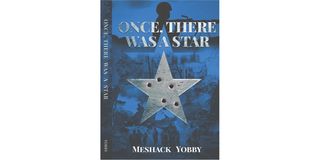Writer explores joys, sorrows of Somalia in debut novel

The cover of 'Once, There Was a Star' by Meshack Yobby.
What you need to know:
- The story of Somalia can’t be told without infusing the culture of its people, the traditions and oral literature, and the writer does a stellar job of infusing all these in the story, deftly weaving the translations into the story without breaking its pace or mood.
- The book’s blurb talks about how the quest for power can forever change the course of history, and it is a story that’s as much Somalia’s as it is the world’s.
Title: Once, There Was a Star
Author: Meshack Yobby
Year of Publication: 2021
Reviewed by: Faith Oneya
Celebrated columnist Dan Carpenter once wrote that the writer gets his fix from others’ joys and sorrows. And in Meshack Yobby’s debut novel, Once, There Was a Star, one begins to see what Carpenter might have meant.
Somalia has always been a fascinating topic for writers, and Yobby is no different, especially after work exploits took him to Dadaab Refugee Camp where he came face to face with the ravages of war in Somalia and which made him “question what dignity and freedom meant” as he writes in the book’s dedication.
Yobby is a writer and filmmaker living in Nairobi, Kenya whose work has exposed him to different political realities.
In this historical novel, Yobby tenderly traces Somalia’s history from 1977 to the nineties dispatched from the frontlines of a family through the lives of the main characters: Ismail Muse and his inquisitive daughter, Halima, who, if nothing else, busts any stereotypes of how a Somali girl should act or behave. And if like me, father-daughter connections warm your heart, then their relationship might be the highlight of the book.
Connection
The father-daughter connection in the book is quite striking, and the writer delicately unpacks the intricate details of the love, laughter and banter between them. Her mother, Sahra, remarks that “You can carry a whole human for nine months, feed and clean her, but she will choose the person that lives with goats” in reference to her father, who herded goats.
The book, quite appropriately, begins with a quote from Kenyan-Somali poet Warsan Shire’s poem “Home”: “No one leaves home until home is a sweaty voice in your ear saying- leave, run away from me now”.
Set in Hargesia, the book thrusts to the fore themes like displacement from war, home, love, survival, death, Female Genital Mutilation (FGM) and all the horror and beauty that comes from a country where blood spilling is not strange news.
Heartbreaking
Halima’s FGM experience is particularly graphic and heartbreaking, with her mother Sahra casually telling her:
“This is how you become a woman. Keep quiet. It will be over soon, and then I will make you a very nice meal and give you bananas.”
The story of Somalia can’t be told without infusing the culture of its people, the traditions and oral literature, and the writer does a stellar job of infusing all these in the story, deftly weaving the translations into the story without breaking its pace or mood.
The book’s blurb talks about how the quest for power can forever change the course of history, and it is a story that’s as much Somalia’s as it is the world’s.
The haunting and compelling book with absolutely memorable characters is evidence of Yobby’s emotional reach as a prose writer.





